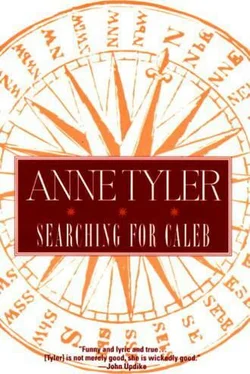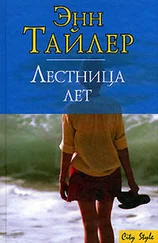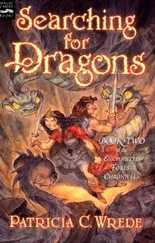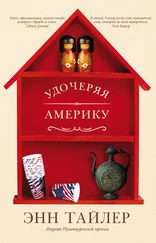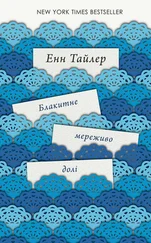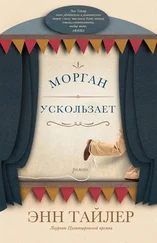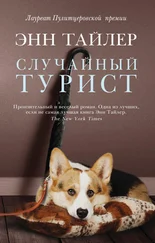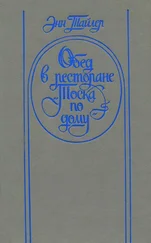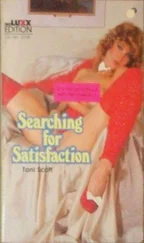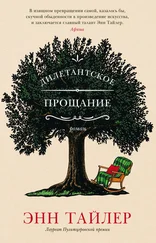Her mother would be talking in the dining room, but such a different mother — twinkling and dimpling and telling terrible giggling stories about Philadelphia. Aunts would be grouped around her, drinking their fifth and sixth cups of coffee. Aunt Sarah and Aunt Laura May were spinsters and still lived next door in the grandfather’s house along with the bachelor Uncle Dan. Uncle Two’s wife Lucy and Uncle Mark’s wife Bea were Pecks by marriage only, and lived in the other two houses. They were not as important as the true Peck aunts, but then they were the mothers of the cousins. And of course, presiding over everyone was the great-grandma, a tidy, brownish woman. The white rims showing beneath her irises gave her a look of reproach, but as soon as she saw Justine she smiled and the rims disappeared. She offered Justine an enormous Baltimore breakfast — two kinds of meat, three kinds of pastry, and a platter of scrambled eggs — but Justine wasn’t hungry. “Naturally,” her mother said, laughing her summer laugh, “she’s anxious to see her cousins,” and she tied Justine’s sash and gave her a pat and sent her off.
Justine had six cousins. All of them looked like her and talked like her, all of them knew the story of how Grandfather Peck had fooled the burglar. It was very different from Philadelphia, where her mother, coming to the school play, referred to “that dark little boy” and asked, “Who was the child who spoke with such a nasal twang?” With her cousins, there was no need to worry. Baltimore was the only place on earth where Justine would not be going over to the enemy if she agreed to play Prisoner’s Base.
Yet even here, wasn’t she an outsider of sorts? Her last name was Mayhew. She lived in Philadelphia. She did not always understand her cousins’ jokes. And though they drew her into every game, she had the feeling that they were trying to slow down for her in some way. She envied them their quick, bubbling laughter and their golden tans. Occasionally, for one split second, she allowed herself to imagine her parents painlessly dead and some uncle or other adopting her, changing her name to Peck and taking her to live forever in Roland Park with its deep curly shadows and its pools of sunlight.
At such times Aunt Bea, coming out to the front porch to shade her eyes and check the children, would smile and sigh over poor little plain Justine, whose pointed face was wisped with anxiety so that it looked like crazed china or something cobwebbed or netted. And who ran so artificially, so hopefully, at the edge of the other children’s games, kicking her heels up too high behind her.
In the evening they all went home. The four houses gave the illusion of belonging to four separate families. But after supper they came out again and sat on Great-Grandma’s lawn, the men in their shirtsleeves and the women in fresh print dresses. The children grew over-excited rolling down the slope together. They quarreled and were threatened with an early bedtime, and finally they had to come sit with the grownups until they had calmed down. Sweaty and panting, choking back giggles, itchy from the grass blades that stuck to their skin, they dropped to the ground beside their parents and looked up at the stars while low measured voices murmured all around them. The oldest cousin, Uncle Mark’s daughter Esther, held her little brother Richard on her lap and tickled him secretly with a dandelion clock. Nearby, Esther’s twin sisters, Alice and Sally, were curled together like puppies with Justine in the middle because she was new and special. And Uncle Two’s boys, Claude and Duncan, wrestled without a sound and without a perceptible movement so they wouldn’t be caught and sent to bed. Not that the grownups really cared. They were piecing together some memory now, each contributing his own little patch and then sitting back to see how it would turn out. Long after the children had grown calm and loose and dropped off to sleep, one by one, the grownups were still weaving family history in the darkness.
* * *
In the winter of 1942, when Justine was nine, her father left for the war. The apartment was dismantled, a moving van came, and Justine and her mother took the train to Baltimore. Her mother cried all the way down. When they arrived she spilled out of the train and into her sisters’ arms, still weeping, with her curls plastered to her face and her nose as pink as a rabbit’s. Her sisters looked flustered and kept searching their purses for fresh hankies. The situation was new to them; no Peck had ever gone to war. It was believed that old Justin had mysteriously avoided the Civil War altogether, while every member of the family after him had possessed a heart murmur of such obviousness that they had been excused from even the mildest sports, the women cautioned against childbirth and the men saved from combat and long marches and the violence of travel by the unique, hollow stutter in their chests. Which did not prevent them from standing in a semicircle, bright-eyed and healthy and embarrassed, around their baby sister in the railroad station. It was their father who finally took charge. “Come, come,” he said, and he herded them out of the station and into the line of Fords at the curb. Justine and her mother rode in his car, at the head of the procession. Justine’s mother kept sniffing. Nothing irritated Grandfather Peck more than the sound of someone sniffing. “Look here, Caroline. We people don’t cry . Get a hold of yourself,” he said.
“I can’t help it, Father. I just can’t help it. I keep thinking of ways I could have been nicer to him. I mean I was never exactly — and I’m just certain he’s going to be killed.”
“He won’t be killed,” said Justine.
But nobody was listening.
They settled in Great-Grandma’s house, since it had the most room. Justine was entered in the girls’ school that Esther and the twins attended. Bit by bit she forgot almost completely the dark, bearded world of Philadelphia, and her mother grew carefree and girlish. Her mother seldom mentioned Sam Mayhew any more but she wrote him dutifully once a week, saying everyone was fine and sent him best regards. Only Justine, looking up sometimes from The Five Little Peppers or a game of backgammon, had a sudden picture of Sam Mayhew’s sad, kind face and wondered if she had not missed out on something, choosing to be her mother’s child alone.
Yet there were her cousins, always embarked on some new project. Esther wrote plays and her twin sisters shared a single role, speaking in unison. Justine played the princess in Aunt Laura May’s blood-red lipstick. Little Richard would take any part you gave him, he was so happy to be included. And Uncle Two’s son Claude was fat and studious; he was fine for rainy days, when he told horror stories in a hair-raising whisper in the gloom of the pantry stairwell.
But Duncan Peck was an evil, evil boy, and all his cousins worshipped him.
Duncan was prankish and reckless and wild. He had a habit of disappearing. (Long after she was grown, Justine could still close her eyes and hear his mother calling him — a soft-voiced lady from southern Virginia but my, couldn’t she sing out when she had to! “Dun-KUNN? Dun-KUNN?” floated across the twilit lawn, with no more response than a mysterious rustle far away or a gleam of yellow behind the trees, rapidly departing.) While the rest of the cousins seemed content to have only one another for friends, Duncan was always dragging in strangers and the wrong kind of strangers at that, ten-year-old boys with tobacco breath and BB guns and very poor grammar. His cousins took piano lessons and hammered out “Country Gardens” faithfully for one half hour a day, but all Duncan would play was a dented Hohner harmonica—“Chattanooga Choo Choo” complete with whistles and a chucka-chucka and a country-sounding twang that delighted the children and made the grownups flinch. His great-grandma complained that he was impudent and dishonest. It was perfectly obvious that he was lying to any adult who asked him a question, and his lies were extreme, an insult to the intelligence. Also he was accident-prone. To his cousins that was the best part of all. How did he find so many accidents to get into? And such gory ones! He never just broke a bone, no, he had to have the bone sticking out , and all his cousins crowding around making sick noises and asking if they could touch it. He was always having a finger dangle by one thread, a concussion that allowed him to talk strangely and draw absolutely perfect freehand circles for one entire day, a purple eye or an artery opened or a tooth knocked horizontal and turning black. And on top of all that, he was never at a loss for something to do. You would never see him lolling about the house asking his mother for ideas; he had his own ideas, none of which she approved of. His mind was a flash of light. He knew how to make the electric fan drive Richard’s little tin car, he could build traps for animals of all kinds including humans, he had invented a dive-proof kite and a written code that looked like nothing but slants and uprights. Tangled designs for every kind of machine littered his bedroom floor, and he had all those cousins just doting on him and anxious to do the manual labor required. If he had been a cruel boy, or a bully, they never would have felt that way, but he wasn’t. At least not to them. It was the grownups he was cruel to.
Читать дальше
